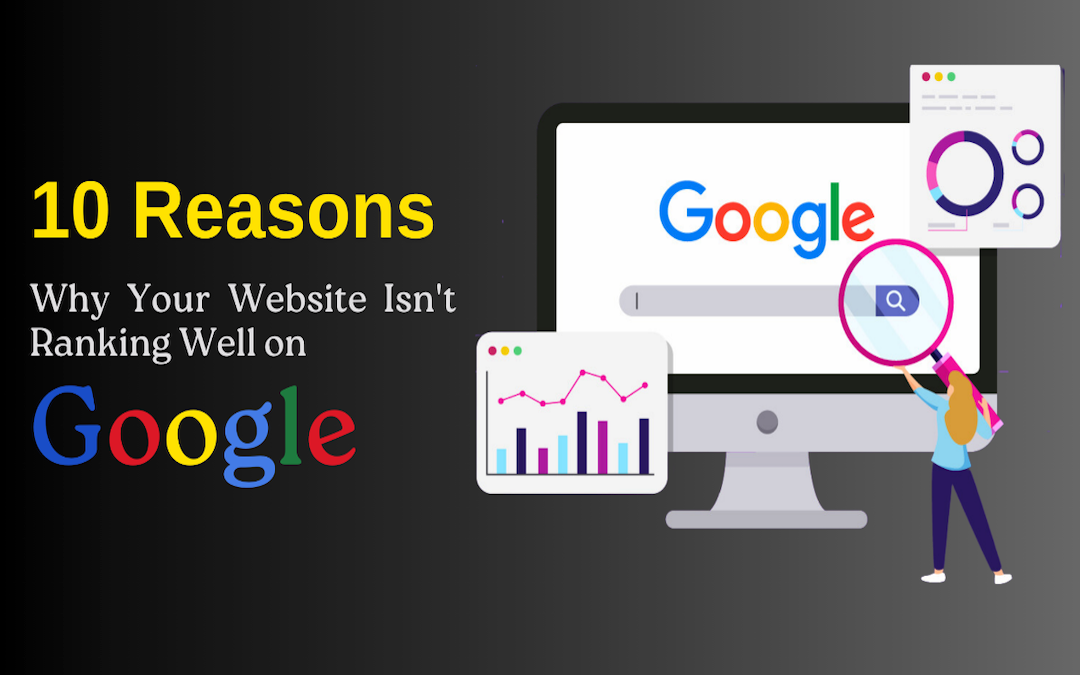
Wondering why your website isn’t ranking well on Google? It’s a common concern for businesses today. Various hidden factors, including inadequate optimization techniques, technological issues, and more, might suppress your visibility. In this blog, we’ll uncover ten key reasons behind low rankings and how professional digital marketing services can help boost your online presence.
Why Is Google Ranking Essential for Your Website?
There are several reasons why you need to rank well on Google, and here are a few.
- Enhanced Visibility: Having a top-ranking position enhances the visibility of your website. Ultimately, it increases the chances of grabbing the interest of potential clients.
- Greater Click-Through Rates (CTR): The average CTR for organic search results for the first position on Google is 27.6%. This makes it very likely that you will capture more traffic.
- Better Conversion Opportunities: Your chances of converting visitors into customers significantly improve with traffic volumes. Engaging with conversion rate optimization consultants can assist you in optimizing these opportunities.
- Improved Trust and Credibility: Websites that occupy the first search results are viewed as more authoritative, hence increasing the trust of the brand offered.
- Better Return on Investment: Getting to the top generates more clicks, which in turn improves ROI. You can boost your ranks by optimizing your plan with the help of an experienced SEO marketing company.
- Competitive advantage: It's critical to keep ahead of your rivals since the top result has a 10x higher chance of getting a click than the tenth place.
Challenges Impacting Your Website's Google Ranking
Securing a prominent position on Google is vital for establishing an online presence, but numerous obstacles can impede your advancement. These issues, including ineffective SEO tactics, technical roadblocks, and low-quality content, can compromise the performance of your website. The first step to optimizing your website and raising its search engine position is comprehending these difficulties. Here are some common issues that can impact your website's Google ranking, along with practical strategies to overcome them:
1. Technical Issues

- Slow Website Speed: Pages that load slowly might turn off visitors and hurt your search engine results. Useful Tip: Use caching, optimize images, minify CSS and JS, and think about utilizing a content delivery network (CDN).
- Poor Mobile Optimization: A site not optimized for mobile devices can rank lower, as mobile-first indexing is crucial. Useful Tip: Implement responsive design, test mobile usability, and ensure fast load times on mobile.
- Broken Links: Non-functional links disrupt the user experience and harm SEO performance. Useful Tip: Use tools like Google Search Console, Screaming Frog or Broken Link Checker to do routine audits and repair broken links.
- Indexing Errors: Improper indexing settings in your robots.txt or meta tags can prevent Google from crawling your site. Useful Tip: Ensure robots.txt and meta tags are correctly configured to allow proper crawling and indexing.
2. Content-Related Problems
- Low-Quality Content: Content that lacks depth, originality, or relevance fails to engage users or satisfy search intent. Useful Tip: Produce unique, worthwhile content that offers in-depth insights and aligns with user intent.
- Duplicate Content: Replicating content across pages confuses search engines and can lead to penalties. Useful Tip: Use canonical tags to indicate preferred versions of content and avoid internal duplication.
- Keyword Stuffing: Overloading content with keywords appears spammy and can reduce ranking potential. Useful Tip: Collaborate with a content marketing company to use keywords naturally within content. They can help you focus on readability and user experience to maintain a natural flow while still optimizing for SEO.
3. Keyword Issues
- Wrong Target Keywords: Focusing on overly competitive or irrelevant keywords can hinder ranking. Useful Tip: Conduct thorough keyword research to target relevant, achievable keywords for your niche.
- Lack of Long-Tail Keywords: Ignoring specific, niche keywords limits your chances of ranking for targeted queries. Useful Tip: Use longer phrases aimed at more specialized, less competitive queries.
- Poor Keyword Placement: SEO suffers when keywords are not organically included in URLs, meta descriptions, and headers. Useful Tip: Use headings, meta descriptions, and URLs where appropriate to include keywords, but do so strategically and naturally.
4. Backlink Problems
- Low-Quality Backlinks: Links from spammy or irrelevant sites can hurt your ranking. Useful Tip: Prohibit low-quality backlinks and concentrate on getting quality links from related sites instead.
- Insufficient Backlinks: It's difficult to increase ranks and establish authority without high-quality backlinks. Useful Tip: Engage in guest blogging influencer outreach and create link-worthy content to build backlinks.
- Lack of Anchor Text Optimization: Misusing anchor texts can reduce the effectiveness of your backlinks. Useful Tip: Ensure anchor texts are descriptive, relevant, and diverse to improve link value.
5. User Experience (UX) Issues

- High Bounce Rate: Users who rapidly abandon your website indicate to Google that the quality of your content is lacking. Useful Tip: Improve content relevancy, optimize page speed, and enhance visual appeal to engage visitors.
- Core Web Vitals: Google assesses the performance of your website for users by considering Core Web Vitals, such as stability, interactivity, and loading speed. Your rankings might drop if you do ineffectively in these areas. Useful Tip: Make sure your website loads more quickly, maintains visual stability, and offers rapid interactivity to meet Core Web Vitals requirements. This will enhance user experience and SEO.
- Poor Navigation: A confusing layout makes it difficult for users to find information, reducing dwell time. Useful Tip: Simplify site structure, use clear calls to action, and ensure intuitive navigation for users.
- Lack of Secure HTTPS: Websites without HTTPS encryption are flagged as insecure, which affects rankings. Useful Tip: Implement SSL (Secure Sockets Layer) certificates to switch your site to HTTPS and enhance trust and security.
6. Competitive Environment
- Strong Competitor Strategies: It's more difficult to beat competitors if they have superior links, content, or tactics. Useful Tip: Examine rival strategies and find ways to surpass them with better SEO and content. Digital marketing services can help you significantly with competitor analysis.
- Market Saturation: Entering a highly competitive niche makes ranking more challenging. Useful Tip: Focus on niche keywords and develop unique value propositions to stand out in competitive markets.
7. Lack of Regular Updates
- Outdated Content: Your website might appear less relevant if you don't update the content frequently. Useful Tip: Update content regularly to maintain relevance and guarantee timely and accurate information. You can maintain your competitiveness in search results by developing a regular content update plan with the assistance of an experienced content marketing company.
8. Poor Local SEO Practices
- Incomplete Google Business Profile (GBP): Local search results are impacted by overlooking local SEO tools such as Google Business Profile (formerly Google My Business). Useful Tip: Make sure your Google Business Profile is complete and optimized, including correct company information and photos.
- Inconsistent NAP (Name, Address, Phone Number) Information: Discrepancies in your NAP details across directories harm credibility. Useful Tip: Ensure name, address, and phone number consistency across all directories and platforms.
9. Algorithm Changes
- Unaware of Updates: Google frequently updates its algorithms, and failing to adapt can cause ranking drops. Useful Tip: Stay updated on Google's algorithm changes through SEO news and trends and adjust strategies accordingly.
- Non-Compliance with Guidelines: Practices that violate the rules set by search engines, particularly Google, are outlined in their Webmaster Guidelines. The purpose of these rules is to guarantee that websites are ethical, fair, and user-value-oriented. Useful Tip: Ensure your site adheres to guidelines related to content quality, link building, and technical practices.
10. Lack of SEO Investment
- No Professional SEO Assistance: Attempting to manage SEO efforts without the help of experienced digital marketing services. This can result in suboptimal results, missed opportunities, and potential issues that must be addressed efficiently. Useful Tip: Invest in the best SEO marketing company to benefit from advanced tools, expertise, and strategic execution.
- Insufficient Tools or Analytics: Not leveraging tools like Google Analytics and Search Console can leave issues undetected. Useful Tip: Utilize Google Analytics, Google Search Console, SEMrush, and additional SEO tools to monitor performance and detect any problems.
Conclusion
In a nutshell, improving your website's Google ranking requires addressing several key factors, from SEO issues to user experience. Implementing the strategies discussed in the blog will help you see measurable improvements in your site's performance. Moreover, leveraging the right digital marketing services can overcome these challenges and boost your online visibility. It's time to get noticed—get in touch and let us help you grow!
Share this post
Leave a comment
All comments are moderated. Spammy and bot submitted comments are deleted. Please submit the comments that are helpful to others, and we'll approve your comments. A comment that includes outbound link will only be approved if the content is relevant to the topic, and has some value to our readers.

Comments (0)
No comment